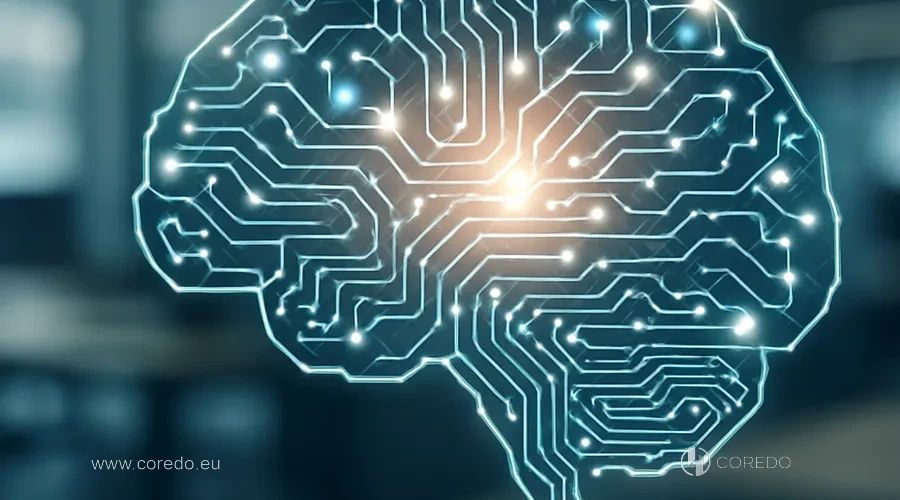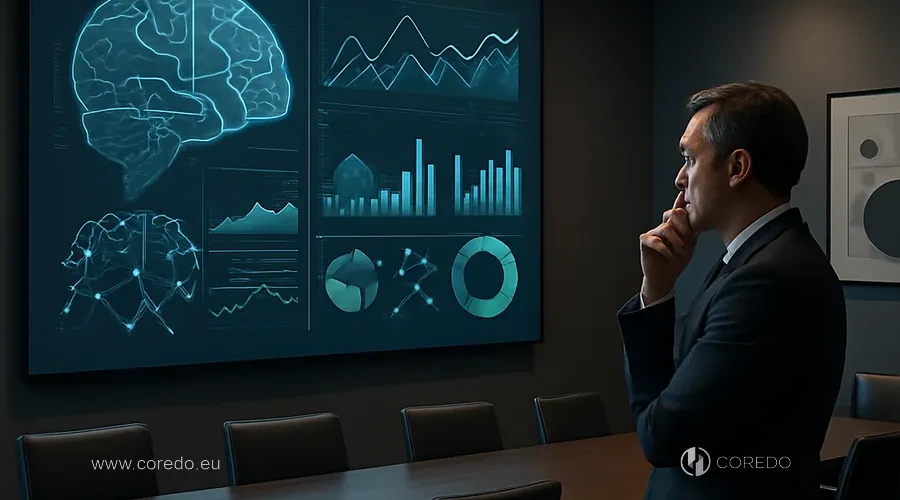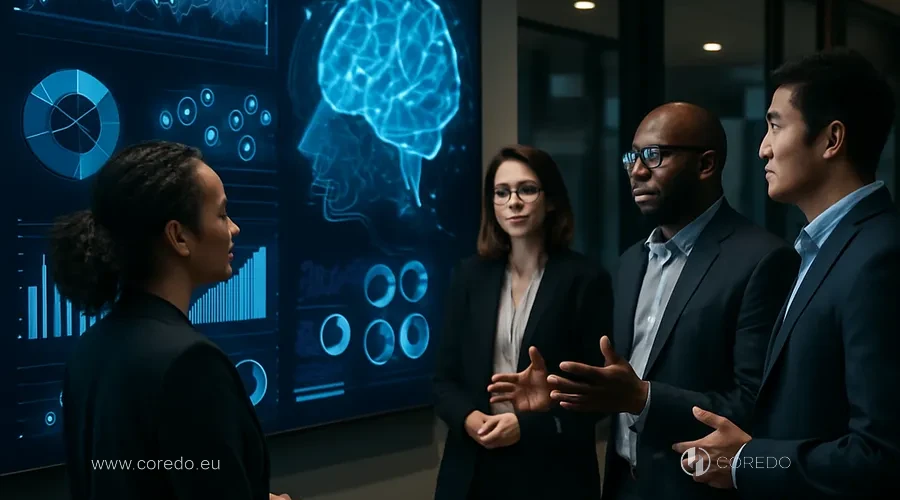In 2025 the corporate world faced a phenomenon that just five years earlier seemed like science fiction: virtual colleagues and intelligent AI agents are already able to perform a month’s worth of work in hours, and their cognitive AI systems are becoming an integral part of the strategic infrastructure of international companies. According to McKinsey, more than 40% of European and Asian enterprises have already implemented cognitive artificial intelligence (CAI) in key business processes, and in some industries the share of automated solutions exceeds 60%[rich_content:1].
At the same time, new challenges come with the opportunities: how to ensure digital trust in AI agents, minimize the risks of centralization and moral failures, and comply with ethical and legal norms across different jurisdictions? How to scale corporate AI solutions without losing control over user identity and the quality of decision-making? These questions are becoming central for executives, entrepreneurs, and chief financial officers operating in the EU, Asian, and CIS markets.
I see the demand for reliable, transparent, and strategically calibrated AI solutions rapidly growing. In COREDO we encounter this daily: from registering legal entities in the Czech Republic and Singapore to obtaining financial licenses and supporting the implementation of cognitive AI agents into corporate processes. This article is not just a review of trends, but a practical guide for those who want not only to keep pace with AI development, but also to use it as a strategic advantage.
If you are looking for answers on best practices for implementing cognitive AI systems, assessing risks and ROI, ethics and decentralization, read on. Here you will find not only an analysis of global trends but also concrete cases, proven solutions, and strategic ideas that already work in international business.
Cognitive AI systems: what they are and how they work

Having studied the basics of cognitive systems and their principles, let’s move on to how artificial intelligence has developed, from classical algorithms to modern LLMs and multi-level cognitive architectures.
The evolution of artificial intelligence: LLMs and cognitive systems
The first waves of AI adoption were associated with generative AI and LLMs — language models capable of processing vast amounts of data and generating texts, code, images. On the other hand, COREDO’s practice confirms: this is not enough to solve complex corporate tasks. Modern business requires not just automation but deep cognitive integration — systems capable of causal reasoning, long-term memory, and moral reflection.
Cognitive AI systems (CAI) are built on principles close to human thinking: they model the world (world models), form an individual user identity, and take into account context and the consequences of decisions. Key technologies here include V-JEPA (intuitive reasoning), cognitive architectures, thought simulation, and self-supervised learning. It is these components that allow intelligent agents not just to execute instructions but to adapt to the dynamics of the corporate environment.
Causal reasoning in AI
Unlike LLMs, cognitive AI systems build causal chains and use long-term memory (long-term memory) to form stable behavior patterns. For example, one of COREDO’s projects to implement corporate AI agents in an EU financial group showed that the use of long-term memory made it possible not only to increase forecasting accuracy but also to provide personalization of services for different divisions.
It allows AI agents to take into account the history of interactions, adjust behavior depending on changes in corporate policy, and even form a unique user identity. Such an approach is critically important for international companies where identity and personalization in AI become the foundation for building digital trust.
Modeling and simulation of thinking
Modern cognitive AI systems use methods for modeling reasoning, metacognition, and simulation of thinking, going beyond classical LLMs. For example, V-JEPA and scenario planning allow intelligent agents not just to generate answers but to analyze the likely consequences of decisions, build scenario analyses, and predict the behavior of key actors under conditions of uncertainty.
In one of COREDO’s case studies for an Asian technology company, an architecture was implemented combining Bayesian inference, world modeling, and self-supervised learning. This not only improved the accuracy of predictive analytics but also reduced cognitive load on users – employees gained access to intuitive interfaces, and corporate decisions became more transparent and predictable.
The impact of AI on business and users

The impact of AI on business and users is becoming one of the key factors in the development of modern companies and the formation of new user practices. Intelligent systems help businesses increase efficiency, implement innovations, and create new interaction scenarios with people. Next, we will look at how exactly AI is changing the role of employees and opening new opportunities for businesses and their customers.
Virtual colleagues, AI solutions for business
The emergence of virtual colleagues and scalable AI agents is fundamentally changing the structure of corporate processes in Europe and Asia. Intelligent agents take on routine, analytical, and even creative tasks, allowing employees to focus on strategic initiatives. The solution developed at COREDO for a large European distribution company made it possible to scale AI solutions to 12 branches without loss of kquality and control – thanks to the implementation of cognitive architectures and digital trust systems.
The key challenge is to ensure not only efficiency but also transparency: users must understand how and why AI makes decisions, how trust in AI systems is calibrated, and how moral and legal norms are taken into account. Here, not only the technology matters, but also the competent integration of AI agents into corporate culture.
AI agents and digital twins for business
One of the most promising areas is the implementation of digital twins (CDT) and corporate AI agents for strategy analysis, predictive analytics and decision support. In COREDO’s practice there are cases where cognitive digital twins are used to model the behavior of key figures, assess risks, and build scenario planning under conditions of high uncertainty.
For example, for a holding company from the United Kingdom, a system was implemented where CDTs analyzed corporate strategies in real time using probabilistic forecasting and MCAI algorithms. This allowed not only to increase the speed of decision-making but also to minimize reputational risks through continuous monitoring of AI compliance with corporate values.
Thus, the integration of CDTs and AI agents into corporate processes forms a new paradigm of business management, directly affecting the quality of interaction with end users and transforming their experience.
The impact of AI on user experience
Long-term memory and personalization are becoming key factors in building trust in AI systems. The implementation of cognitive AI agents with an individual user identity makes it possible to build long-term relationships between employees, clients and virtual colleagues. The COREDO team implemented a project for a Singaporean fintech company where trust calibration in AI was carried out through continuous feedback and control of the moral integrity of decisions.
This approach not only increases user loyalty but also ensures process transparency, reduces cognitive load, and contributes to the formation of digital trust at all levels of the corporate structure.
Thus, the integration of cognitive AI technologies is already opening up new opportunities for business, as evidenced by practical implementation examples.
Cognitive AI in business: implementation examples

Cognitive AI in business is already actively transforming corporate processes, from automation to strategic decisions and customer interactions. Real implementation examples show not only business efficiency but also new challenges, including antitrust investigations and unique corporate cases.
Corporate cases and antitrust investigations
COREDO’s portfolio includes significant experience in implementing cognitive AI agents and digital twins in different jurisdictions. For example, as part of an antitrust investigation in the EU, intelligent agents were used to model the behavior of key figures and analyze institutional incentives in decision-making. This made it possible to identify hidden patterns of interaction and propose new market development scenarios to the regulator.
Another case is the integration of CDTs and MCAI to evaluate corporate strategies in an Asian holding: digital twins analyzed probabilistic scenarios, helping top management make decisions under high volatility. This approach proved effective in managing complex corporate structures and minimizing moral and reputational risks.
Assessing effectiveness and ROI of AI systems
Assessing the return on investment (ROI) in cognitive artificial intelligence requires a comprehensive approach. At COREDO we use not only classic performance metrics (time savings, cost reduction, productivity growth) but also new indicators: the level of digital trust, metrics of the moral integrity of decisions, and compliance with corporate values.
In one project for a company from Estonia, the implementation of cognitive AI agents made it possible to reduce the decision-making cycle by 40%, increase the transparency of communications between departments, and reduce the number of errors related to the human factor. The ROI analysis included predictive analytics, assessment of long-term consequences, and scenario planning, which ensured sustainable business growth.
AI risks and challenges: militarization and ethics

AI risks and challenges related to militarization and ethics are becoming some of the most discussed topics for international security and legal regulation today. Active implementation of artificial intelligence in the military sphere is accompanied by new threats: from the loss of human control over autonomous systems to complex ethical dilemmas related to machines making decisions in critical situations. Below are real examples of AI militarization and agent failures that illustrate the urgency of these issues.
Examples of militarization and failures of AI agents
With the development of cognitive AI systems, new threats are emerging – from the militarization of artificial intelligence to the appearance of so-called cognitive bombs and errors in institutional incentives. International practice has already recorded cases where incorrect operation of AI agents led to large-scale failures in defense systems and corporate networks.
Ethical aspects of trust calibration
The ethics of artificial intelligence is becoming a key direction in the development of cognitive systems. Modern alignment architectures (ALI, CMF), as well as startups like LawZero and MindCast AI, offer new solutions for trust calibration, control of the moral integrity of judgments, and ensuring AI compliance with international and local legal norms.
In COREDO’s practice such solutions are integrated through multi-level control systems, continuous algorithm audits, and employee training to work with AI agents. This not only minimizes moral and reputational risks, but also helps to form a sustainable corporate culture of digitalabout trust.
The future of decentralized AI

The future of decentralized AI is linked to a shift from centralized models and infrastructure to open, distributed ecosystems where participants manage computing, data, and innovation development themselves. This approach not only extends the capabilities of artificial intelligence beyond corporate barriers, but also opens new modes of interaction that blockchain technologies and decentralized computing resources are already leading toward.
Blockchain for AI development
One of the main trends in recent years has been the decentralization of AI and the growth of decentralized AI alliances based on blockchain platforms and Web3. Examples like SingularityNET, Artificial Superintelligence Alliance, OpenCog Hyperon, Baby AGI, Thousand Brains Project, and Numenta show that decentralization not only enhances companies’ competitiveness but also minimizes the risks of centralization, militarization, and abuse.
The COREDO team analyzes and implements blockchain-based solutions for AI agents, ensuring transparency, trust, and scalability of corporate AI solutions. In one case for a company from Dubai, a decentralized AI alliance accelerated the integration of new services and reduced infrastructure costs.
Decentralization opens new possibilities for corporate strategies: companies can create their own ecosystems of virtual colleagues, manage user identity, integrate digital twins and intelligent agents into global business processes without the risk of monopolization or loss of control.
AI recommendations for business
The development of artificial intelligence and AI cognitive systems is not only a technological challenge but also a unique opportunity for international business. Implementing intelligent agents, digital twins, decentralized AI alliances, and ethically oriented cognitive architectures enables companies in the EU, Asia, and the CIS not only to adapt to new realities but to outpace competitors, building sustainable digital trust and strategic advantages.
Today, corporate AI implementation is not only about technology, but also about culture, ethics, and strategy.
If you want to harness the potential of AI cognitive systems for business growth and sustainable development, it’s important to act consciously, relying on the best international practices and the experience of trusted partners. The COREDO team is ready to be your guide in this complex but exciting world of intelligent agents, digital twins, and decentralized AI solutions.